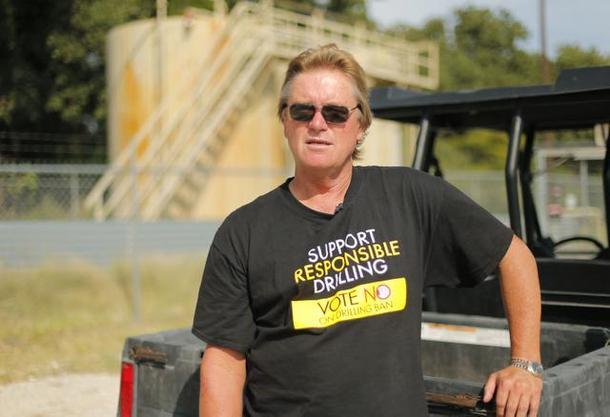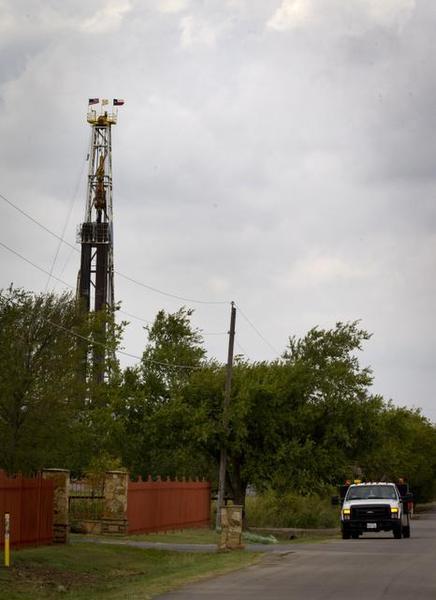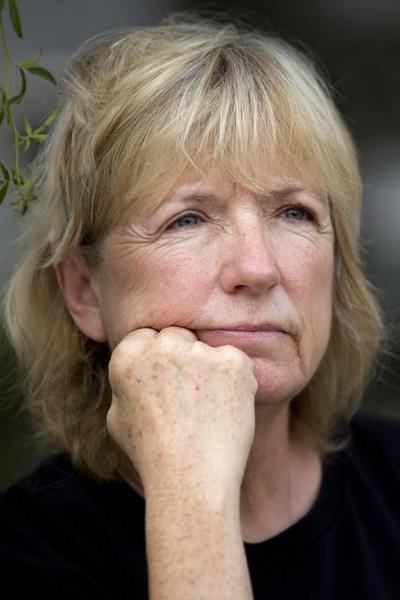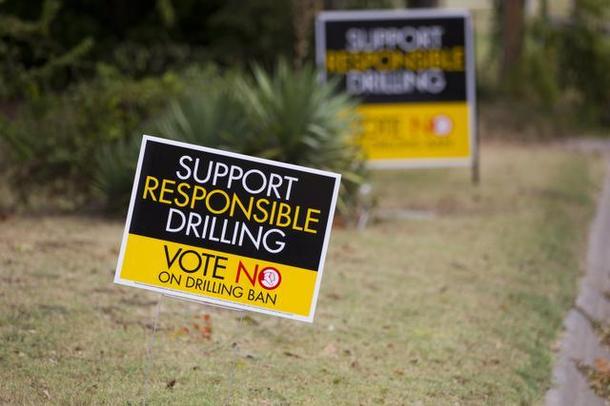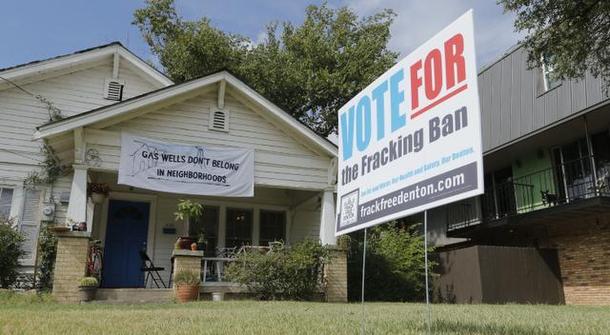DENTON — In a state where the oil and gas industry is king, Denton on Tuesday was poised to become the first city in Texas to ban hydraulic fracturing as voters approved a grassroots initiative against the controversial drilling method.
In unofficial results, 58.6 percent of voters in this college town of 123,000 had cast ballots for an ordinance that will drastically restrict drillers’ attempts to tap the rich natural gas reserves within the city limits. Calling the ordinance unconstitutional, state and industry officials have pledged to contest it in court and state lawmakers have said they may pass legislation to block it.Cathy McMullen, a home health nurse and leader of the Denton Drilling Awareness Group, which collected nearly 2,000 petition signatures to place the issue on the ballot, choked up, wiped away tears and hugged her husband as she celebrated Tuesday night at Dan’s Silverleaf, a downtown bar and concert venue not far from City Hall. “It says that industry can’t come in and do whatever they want to do to people,” McMullen said over the cheers of the 200 people jammed in the bar. “They can’t drill a well 300 feet from a park anymore. They can’t flare 200 feet from a child’s bedroom anymore.”In a statement, Texas Railroad Commissioner David Porter said he was disappointed that voters “fell prey to scare tactics and mischaracterizations of the truth in passing the hydraulic fracturing ban.” “Texas is a global energy leader and has the best job climate in the country because of our fair, even-handed regulatory environment. Bans based on misinformation — instead of science and fact — potentially threaten this energy renaissance and as a result, the well-being of all Texans,” Porter said in a statement.“This issue will continue to be hotly contested. I am confident that reason and science will triumph, and the ban will be overturned,” he said. If approved, the ban will take effect Dec. 2, two weeks after the City Council certifies the election Nov. 18.Mayor Chris Watts said the council is committed to defending the ordinance and “will exercise the legal remedies that are available to us should the ordinance be challenged.”Growing oppositionThe fight over the ban has drawn nationwide attention, making Denton what Watts calls the “global epicenter” on the issue of fracking. It has also divided the community.Denton is in the middle of the Barnett Shale, which covers about 5,000 square miles in North Texas, one of the nation’s largest natural gas fields. There are 272 active wells in the Denton city limits and 212 others within its extraterritorial jurisdiction, according to the city’s website.While fracking’s widespread use has boosted domestic oil and gas production, it has also sparked growing opposition across the country, from New York state to cities in Colorado and California. Denton residents have been complaining about urban drilling since 2009, when a driller put in wells near a park. They were worried about drilling’s effect on public health, welfare and safety. Over the years, Denton, like Fort Worth, Arlington and Mansfield, has revised its ordinances to deal with urban drilling. In its most recent change, Denton imposed a 1,200-foot setback between wells and homes and other structures. But some drillers say their permits, issued before the stronger restrictions were in place, allowed them to sink wells at shorter distances.Frustrated with how the city was handling the situation, McMullen’s group petitioned to put the ordinance on the ballot. The referendum does not ban all drilling, only hydraulic fracturing, a technique that pumps water, sand and chemicals underground to shake gas loose from the shale.But drillers say that traditional wells are not economical and that the ban would effectively stop drilling. They also said the ban usurps the authority of state agencies like the Railroad Commission, which is charged with regulating drilling.‘Only thing left to do’Randy Sorrells, leader of the group opposed to the ban, called Denton Taxpayers for a Strong Economy, said he was not surprised by the voting totals, saying the ban’s backers were guilty of fear mongering on the health issues. He raised his kids near several gas wells with no ill effects, he said. “They preyed on their emotions. Kids having nosebleeds and not being able to play outside,” Sorrells said. “It has been an emotional bandwagon.” Concerned that a fracking ban in Denton could spark similar protests across Texas, the oil and gas industry pumped nearly $700,000 into mailers, television ads and billboards to defeat the initiative. It raised nearly 10 times as much as the $75,000 raised by its opponent, Pass the Ban.But Ed Soph, a music professor at the University of North Texas and a jazz drummer, said he thinks the momentum turned in favor of the ban “from the very beginning.”“We had reached a situation where there was nothing else we could do,” said Soph, who sat quietly near a corner, looking exhausted after working 12 hours at the polls. “The only thing left to do was to put the ban on the ballot and let the people speak,” he said. The city expects the ban to be challenged in court. Attorneys experienced in municipal law say the situation in Denton presents unique legal challenges and may ultimately answer questions about how far a city can go in regulating rigs before and after they’ve moved into neighborhoods.Texas Land Commissioner Jerry Patterson and members of the Railroad Commission have told city leaders that the laws they are relying on simply don’t give them this kind of power.State Rep. Phil King, R-Weatherford, has said he would be among several lawmakers who would offer legislation that would prohibit cities from enacting such bans. He said that there needs to be uniform regulation of the industry statewide and that cities can’t out-and-out ban drilling.Watts, in a statement, said, “The City Council is committed to continuing the review of our gas well ordinance to ensure the utmost health, safety, and welfare of our residents, and we will continue to work with industry representatives to ensure full compliance with our gas well drilling ordinance.”Max B. Baker, 817-390-7714 Twitter: @MaxBBaker



